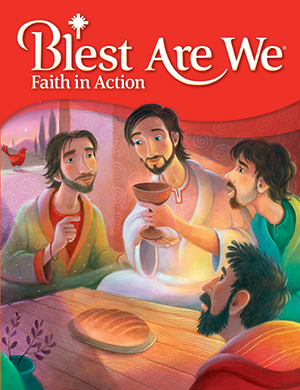When you look at your class roster, you see a wide variety of names for your students. The Catechism of the Catholic Church explains, “Everyone’s name is sacred. The name is the icon of the person. It demands respect as a sign of the dignity of the one who bears it” (# 2158). God calls each person by name (Isaiah 43:1). Jesus, the good shepherd, “calls his own sheep by name” (John 10:3).
Parents choose a name for their child with great care, and they have many reasons for their selection. The name they chose had spiritual, cultural, or family significance for them. It is common to have the same of a patron saint, although it is not required. The Church teaches that any name can be chosen as long as it is not offensive to the Christian faith.
Our name is part of our identity. That is why making fun of someone’s name is a cruel torment, an attack on the person. You know what I mean if anyone ever ridiculed your name. On the other hand, someone in love delights in having a tattoo of their beloved’s name, carving it into a tree, or, in the case of teenagers, writing it over and over.
God apparently thinks names are important. He redubbed Abram and Sarai, his wife, Abraham and Sarah. God told Zachary to name his son John, and when that father did, he regained his power to speak. God instructed both Mary and Joseph to call His Son Jesus. It seems he wanted to make sure it was done. Later, Jesus changed Simon’s name to Peter, meaning “rock,” to signify his role in the Church. And he gave James and John the nickname Sons of Thunder. Mary Magdalene recognized Jesus when he pronounced her name. Stop a moment and imagine Jesus calling you by name.
Share with the students: Tell them about your own name and its meaning for you. Say, “You received your name officially at baptism. The priest met your parents at the door of the church and asked, ‘What name will you give your child?’ Then you were baptized, addressed by that name.”
Art Project: Embellish your name into an icon. Write the letters of your name on a paper, then decorate the letters however you wish. Add color, lines, shapes, or symbols to decorate and celebrate your name. Display the name-icons in the classroom.
Blest Are We Faith in Action Connections: For more opportunities to highlight our personalized call to discipleship, check your grade level program index for ideas related to the theme of Baptism and Vocation.
Some examples:
- Grade 2 Projects and Activities: Unit 1, “Role-Playing Baptism”
- Learn a song: Grade 5, Unit 2, p. 82. “Who Calls You by Name?” or Grade 4, Unit 1, p. 22, “Blest Are We.” Blest Are We Song Book and recordings are available for Grades K-8.
- Scripture Video (Grade 5 Organizer, Flourish): “Saul’s Conversion”
Enjoy a selection of 40 Biblical scripture story videos that accompany the student lesson pages in our Blest Are We Faith in Action series. To view the new scripture videos, Blest Are Faith in Action customers can log into their Flourish Account, and click on the Scripture Videos tab within the grade level organizer. To view a sample video click here.
 About the Author
About the AuthorDr. Lauri Przybysz specializes in equipping families to live their vocation to be domestic churches and signs of God’s love. Lauri received the Doctor of Ministry from the Catholic University of America, and she has been both a Catholic middle school religion teacher and a faith formation coordinator at the archdiocesan and parish levels. She is the mother of 6 children and grandmother of 21.
Product Highlight
 Blest Are We Faith in Action - School Edition Grades K-8
Blest Are We Faith in Action - School Edition Grades K-8
The Blest Are We Faith in Action religious education program engages children, youth, and their families in learning what Catholics believe, how Catholics worship, how Catholics pray, and how Catholics live. Our technology-enhanced learning resources, including eGuides, eBooks, eAssessments, and online chapter reviews expand learning opportunities for students and flexibility for teachers.
Students will enjoy interactive connections with their textbooks, while teachers will find a variety of useful content for helping students on their formative journey of faith.
